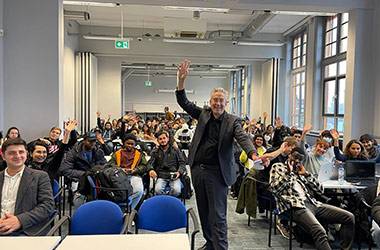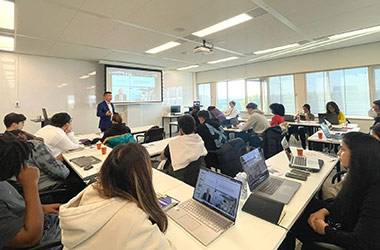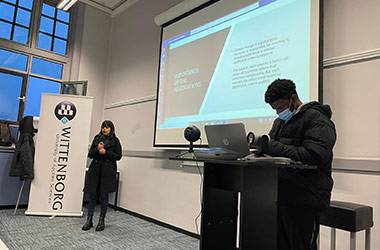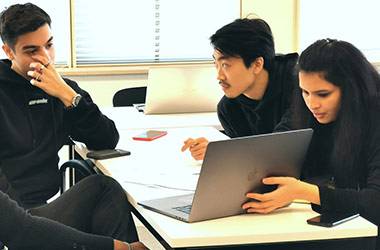Wittenborg Online News!
Wittenborg Students Hope to Do More than Just Blah-Blah-Blah at Simulation of COP26
Wittenborg Students Hope to Do More than Just Blah-Blah-Blah at Simulation of COP26
Wittenborg Students Hope to Do More than Just Blah-Blah-Blah at Simulation of COP26
https://www.wittenborg.eu/wittenborg-students-hope-do-more-just-blah-blah-blah-simulation-cop26.htm
Wittenborg Brings Together Students of 3 Campuses for 3 Days of Climate Change Talk
While world leaders gathered in the pouring rain in Glasgow, Scotland, this week for the COP26 climate change summit along with thousands of other participants, about 150 undergraduate and postgraduate students at Wittenborg University of Applied Sciences also got together yesterday to start their own 3-day summit – a simulation of the one held in Glasgow.
For the first time, thanks to modern technology, the institution was able to get students from three different campuses in two countries – Apeldoorn, Amsterdam and Munich – together for lively debate, presentations and negotiations. The initiative is part of a Project Week assignment.
COP26 is seen by many as the last chance to save the world from climate change. As British prime minister Boris Johnson put it on Monday, the world is at "one minute before midnight" in terms of keeping warming below 1.5C, with the UN predicting a 2.7C rise on the current trajectory, which could lead to catastrophic consequences.
The seriousness of the situation was not lost on students and staff
at Wittenborg as they dove headlong into the topic yesterday morning.
Last month, Wittenborg announced that
for the current academic year it will have the theme of “Climate Change”
connected to its curriculum, teaching, learning and university-wide
activities.

Simulation Game
For the coming days, students have been divided into 7 economic regions, sometimes also key countries, defined as "developed" or "developing", with many of the 100 nationalities at Wittenborg being represented.
Within their groups, students will negotiate their positions on actions to be taken on climate change, and at the same time try to forge alignments with other countries and regions. The aim is that each region produces a policy document that can be presented to the summit at the end of the project week, and that the project is finalised by reaching an overall agreement – or not.
WUAS uses the Climate Action Simulation, a highly interactive, role-playing game. It uses the En-ROADS simulation model to engage a wide range of participants in exploring key technology and policy solutions for addressing global warming.

More than just 'blah blah'
Wittenborg director Peter Birdsall kicked off the conference by welcoming students, reminding them that "things are changing in our society. We are dealing with something that humanity is finding difficult to solve. It is one of those things that too many people need to agree on". He quizzed students on the issues at stake and the different personalities and characters involved, such as the young Swedish activist Greta Thunberg, who already expressed scpeticism about how committed leaders are, calling for more than just "blah-blah-blah".
He also gave a shout-out to the African country Gambia, that according to the Climate Action Tracker was the sole nation taking steps in line with the Paris Agreement – which is meant to help all nations stave off imminent catastrophe.

Businesses as a force for good
After Birdsall, Wittenborg's Assurance of Learning Manager, Kriszta Kaspers, and senior lecturer Dadi Chen gave a presentation on Ethics and Climate Change: Businesses as a force for good. Dr Teun Wolters, Emeritus Professor of Applied Sciences, also presented on why it is so difficult to achieve sustainability.
One of the factors cited by Wolters was that neo-liberalism as an economic philosophy was very strong in the previous decades. "There was a strong belief in free markets and free financial flows; giving way to large multinationals and economic growth was promoted. The IMF and also the World Bank imposed this policy on poor countries. Only China refused to accept free financial flows.
"Fortunately, policy thinking has changed the tide. There is attention to the danger of inequality and to an economy that takes on clean energy and circular technologies. Still, effecting change appears to be difficult. International business should take more responsibility and economic growth should be subjected to strict sustainability criteria. Profits cannot be prioritised to the detriment of the workers. Purpose precedes making money. Will it happen?"
WUP 4/11/2021
by Anesca Smith
©WUAS Press
715 words